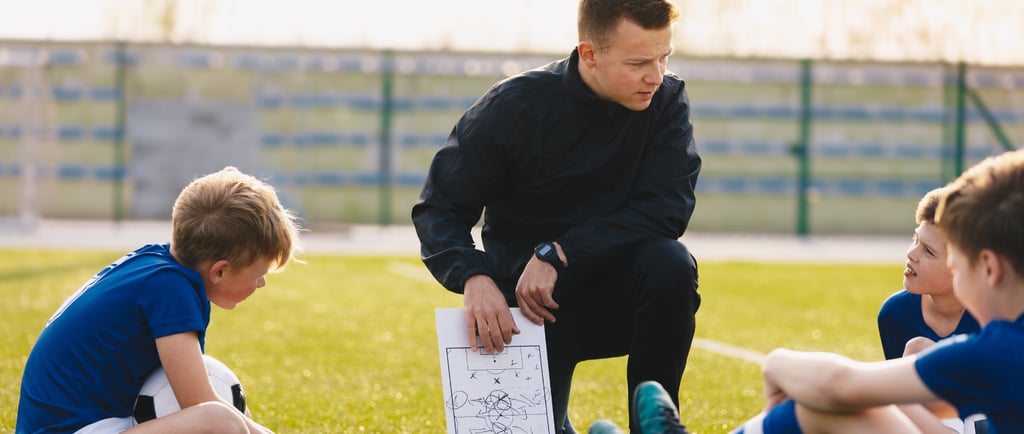Effective Game Preparation
Having a good game plan ahead of the actual game can make a huge impact.
8/22/20244 min read


Game preparation is one of the most critical aspects of coaching youth sports. Whether you are an experienced coach or a parent stepping into the role for the first time, preparing your team for a game goes beyond running drills. It involves setting the right mental framework, building confidence, and creating a cohesive game plan that players can execute under pressure. In this blog, we’ll explore strategies and tips for effective game preparation that can help you set your team up for success.
The Importance of Game Preparation
Preparation is key in sports, just as it is in any other area of life. For young athletes, effective game preparation can significantly impact their performance, confidence, and overall experience. A well-prepared team is not only more likely to perform better but also more likely to enjoy the game and grow from the experience.
According to a study published in the Journal of Sport Psychology, young athletes who engage in consistent, structured preparation are more confident and resilient in competitive situations. This preparation includes physical training, mental conditioning, and strategic planning .
1. Establish a Pre-Game Routine
Consistency is vital in creating a sense of stability and confidence. Establishing a consistent pre-game routine helps players focus and manage their nerves.
Warm-Up Drills: Develop a set of warm-up drills that are repeated before each game. These drills should include dynamic stretches, sport-specific movements, and light exercises that get the players physically ready.
Mental Preparation: Incorporate visualization exercises where players imagine themselves performing well during the game. This helps them mentally rehearse key moments and build confidence.
Team Huddle: End the pre-game routine with a team huddle to reinforce the game plan, set the tone, and boost morale.
2. Create a Game Plan with Clear Roles and Responsibilities
Having a clear game plan is essential for both experienced and novice teams. It gives players a blueprint to follow and helps them understand their roles on the field or court.
Identify Key Players: Assign specific roles based on each player’s strengths. For example, if you have a player who excels at defense, give them responsibilities that maximize that skill.
Simplify Strategies: For younger or less experienced teams, keep the game plan simple. Focus on a few key strategies that the players can execute consistently rather than overloading them with complex tactics.
Reinforce During Practice: Go over the game plan during practices leading up to the game. Use drills that mimic real-game scenarios so players can get comfortable executing their roles.
3. Scouting the Opponent (Within Reason)
While youth sports should primarily focus on development and fun, knowing a little bit about your opponent can be beneficial.
Basic Scouting: For older or more competitive teams, do some light scouting to identify the strengths and weaknesses of your opponent. Knowing if they have a star player or a weak defensive line can help you adjust your strategy.
Adaptability: Teach your players how to adapt during the game. Things might not go as planned, so they need to be ready to adjust based on what happens on the field.
4. Focus on the Mental Game
Mental toughness is crucial in competitive sports, and it’s never too early to start teaching it. Helping young athletes develop mental resilience will not only prepare them for game day but also for challenges outside of sports.
Positive Affirmations: Encourage players to use positive self-talk. Teach them to replace negative thoughts like “I’m going to mess up” with “I’ve got this.”
Visualization and Breathing Techniques: Teach players to visualize success and practice deep breathing exercises to manage anxiety and stay focused during high-pressure situations.
Growth Mindset: Emphasize that mistakes are part of learning. Instead of dwelling on errors, teach players to focus on the next play and how they can improve.
5. Communicate Effectively with Parents
Parents play a critical role in game preparation, especially for younger athletes. Keeping them informed and involved can enhance their child’s experience and performance.
Pre-Game Briefings: Hold short meetings with parents before the season starts to explain your approach to game preparation. Discuss the importance of positive reinforcement, supporting the team’s goals, and managing expectations.
Sideline Behavior: Encourage positive sideline behavior. Parents should be reminded to cheer for effort, respect officials, and avoid coaching from the stands, which can confuse players.
6. Manage Pre-Game Nerves
Nerves are natural, but they can affect performance if not managed correctly. Help your team channel that nervous energy into focus and excitement.
Relaxation Techniques: Use pre-game relaxation techniques like deep breathing or stretching to help players calm their nerves.
Fun Warm-Ups: Incorporate fun, low-pressure activities into the warm-up routine to keep the atmosphere light and reduce stress. Simple games like tag or light scrimmages can help players loosen up before the game.
7. Have a Post-Game Plan
Game preparation doesn’t end when the final whistle blows. How you handle the post-game period is just as important.
Focus on Learning: Win or lose, encourage your team to reflect on what they learned during the game. Highlight positive takeaways and identify areas for improvement.
Individual Feedback: Offer constructive feedback to each player. Be specific about what they did well and provide actionable advice on areas they can work on.
Celebrate Effort: Reinforce the importance of effort and improvement over the outcome. Recognize players who gave their best effort, displayed good sportsmanship, or showed growth in their performance.
Additional Insights
A report by the Positive Coaching Alliance emphasizes that a well-prepared team is more likely to enjoy the game, regardless of the result. Preparation builds confidence and reduces anxiety, making it easier for young athletes to perform at their best while still having fun. Additionally, research published in the Journal of Applied Sport Psychology found that athletes who engage in mental rehearsal and have clear pre-game routines experience lower levels of pre-game anxiety and better performance.
Conclusion
Game preparation in youth sports is about more than just getting the physical skills right; it’s about setting the right mental and emotional framework for your players. By establishing routines, creating a clear game plan, focusing on mental toughness, and communicating effectively with parents, you can help your team feel more prepared, confident, and excited to compete. Remember, your goal as a coach is not just to win games but to develop well-rounded athletes who love the sport and grow as individuals. With these strategies, you can create a game-day experience that your players will carry with them long after the final whistle blows.

